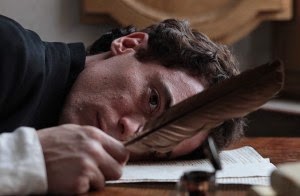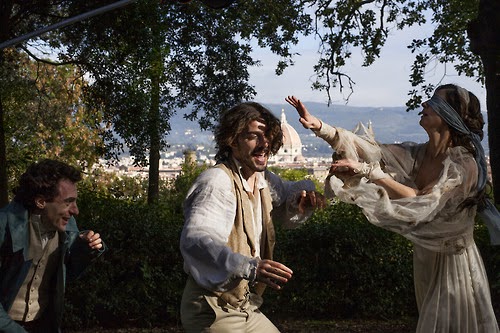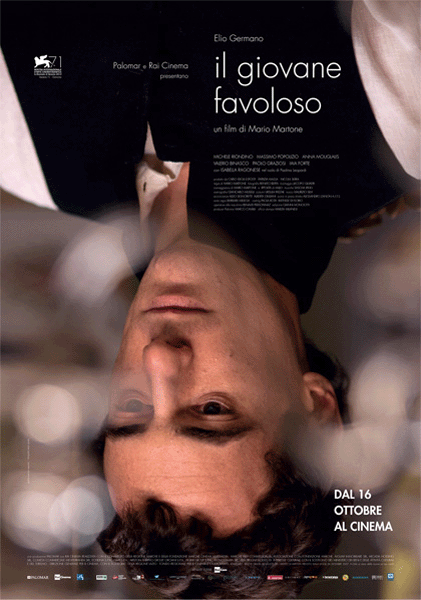Il Giovane Favoloso directed by Mario Martone is an Italian movie which participated in Venezia Film Festival last September. I was lucky enough and I could see it in a special premiere for teachers in Rome, before it will be released in theatres on 16th October.
The film is a biopic of Italian Romantic poet, Giacomo Leopardi (1798 - 1837). Italian students inevitably meet him on their path through high school and two are the chances: either they love him or they hate him. Impossible to remain indifferent.
For me it was love at first line, when I studied his poems in my final year at high school. I felt like that genius young man from a distant time could read my deepest thoughts and put them on paper in powerful words.
Touching and at times disturbing, his pessimism and his humanity, his melancholy and his sufferings, have stayed with me while turning into an adult. I still treasure those poems as remarkable moments of self-realization and growth.
Said that, you may guess my watching this film couldn't be nothing less than an emotional experience: it was something like meeting Leopardi in the flesh and finally giving him a body and face, while in my mind he had only been a voice.
Touching and at times disturbing, his pessimism and his humanity, his melancholy and his sufferings, have stayed with me while turning into an adult. I still treasure those poems as remarkable moments of self-realization and growth.
Said that, you may guess my watching this film couldn't be nothing less than an emotional experience: it was something like meeting Leopardi in the flesh and finally giving him a body and face, while in my mind he had only been a voice.
 |
| "...studio matto e disperatissimo..." (Zibaldone) |
In this movie Giacomo Leopardi is a child prodigy who grows up under the implacable stare of his father, Count Monaldo, in a noble house which is actually an enormous library. His mind escapes the limiting boundaries of that golden prison, reading and studying and writing, as well as daydreaming of the distant real world beyond the horizon. He wasn't free to go out of his house nor to leave his "borgo natio", Recanati, the provincial village he was born in.
 |
| Elio Germano as Giacomo Leopardi in the last years of his life |
In Mario Martone's interpretation, Leopardi is a rebel, but one who didn't accept to fight any of the great fights of his age, at the cost of great solitude and confinement. He was honestly detached from the social or political revolutions of his age, what he was interested in was his poetry and his own personal freedom, the freedom of thinking against the current, the freedom of being unhappy and dissatisfied with Man, Progress and even with Nature.
He was born at the end of the 18th century but he wa not a man of his time, actually: he didn't belong, didn't conform and refused to join any movement. His thought had ancient roots but was projected into the future, beyond time.
Though he always writes about unhappiness, he had his own very personal conception of happiness: happiness was in the longing, in the expectations, in the act of waiting.
He is commonly thought to be a pessimist and a misanthrope, cynical and bitter but in my mind he has always been, instead, a man desperately in love with life and knowledge, with women and the idea of love itself, with the power of words and the excitement of discovery. Only he felt imprisoned in a painfully deforming body, undermined by his own very poor health, and for many years under the control of a suffocating father figure. That must have influenced his personality and his thoughts tremendously. Though there are many who state that Leopardi would have been just the same, if his exceptional brain had belonged to a handsome body, I just cannot think so.
 |
| Elio Germano and Michele Riondino in a scene of the movie |
Ranieri and Leopardi travelled through Italy together for a few years: Rome, Florence and, finally, Naples where Leopardi died in 1837, at the age of 39.
 |
| Mario Martone meets the teachers in Rome |
When asked if he had thought of the youth who were going to see his movie while working on it, director Martone honestly answered he hadn't. No, he hadn't been thinking of the thousands of students who will be watching the movie with their teachers or by themselves, while shooting Il Giovane Favoloso. He propbably just wanted to bring the genius and extraordinariness of a man like Leopardi to the screen, being free to make his own creative directorial choices.
The question was proposed by one of us in the audience, because I am sure, each of the teachers there was wondering, "... but will our students enjoy a film like this?".
Because that was the reason we were invited there, to evaluate the proposal of involve our students in school projects based on this movie.
Though I could appreciate many of Martone's choices, Elio Germano's interpretation, the iconographic references to Leopardi's poetry, the recurrent quotations /readings of his lines and thoughts from Zibaldone or Operette Morali, I still wonder whether our teenage students will be able to find something to appreciate in the 2 hours and 20 minutes they will be sitting there, watching "Il Giovane Favoloso". I really hope so.
I never thought Leopardi was a loser, but I often hear this unfair comment from my students, while they are studying his poems and I am trying to suggest connections to English Romantic poetry.
I so wished this film could help give young people the idea of an extraordinary personality, strong and even fierce, to oppose to that of someone who wrote because he couldn't have done much else, of someone to pity not someone to admire.
I really hoped Martone would underline the aspects in Leopardi's thoughts and life which make his pessimism less dark, less hopeless (for example, his idea of human solidarity, the joy in the expectation, the gratifying experience of the creative process). Instead, I couldn't find many positive signs conveyed in this movie, only reasons and alibis for Leopardi's harshness and gloomy vision of life and humanity.
Unfortuantely, I fear this movie in his honest depiction of the man failed in what one expects to be its aim, that is to give the audience the image of a fabulous young poet. Fabulous in all its meanings: wonderful, extraordinary, very good, having no basis in reality and mythical.
My colleagues teaching Italian literature and my students in their final year will see this film soon a the cinema, because this is one of our school projects this year. I really hope they will be able to find the experience stimulating and thought-provoking. Fingers crossed!
Il Giovane Favoloso will be released in Italian cinemas on 16th October 2014 and will be available for matinee for school students and teachers from 20th October 2014 and all through the school year.

2 comments:
As I wrote you on facebook, I watched this movie yesterday, and I have mixed feelings toward it. The aspect I liked the less was Germano himself: he was too grotesque, riduculous, he looked more like a parody of Leopardi than Leopardi himself, with his huge wild eyes and all the physical quirks. Ben Whishaw interpreting Keats in Jane Campion's Bright Star came to my mind, and I kept comparing the two actors. Where Whishaw seemed able to convey the sheer lyricism and melancholy of Keats, I did not feel a real melancholy in Germano: just someone who overstressed Leopardi's hump. Not to mention that he wasn't able to read Leopardi's poems as Whishaw did with Keats'.
Unlike you, I am not a particular fan of Leopardi - he was never in the list of my favourite poets - but I don't think this movie did justice to his thoughts, neither expressed the core notions of Leopardi's poems (the longing, the memory, the infinite etc etc.) And I don't know if high school students who will watch this movie would feel compelled to read more about Leopardi.
My favourite characters were actually Monaldo and Adelaide :D
Thanks for sharing your thoughts here, Cecilia. I too felt Martone missed the occasion to do justice to such a great poet, even though for reasons different from yours, as I wrote in my post.
Though I didn't mention it in my review, I too went on thinking about Ben Whishaw's Keats, while watching this film. The comparison was inevitable and, of course, I liked Jane Campion's "Bright Star" so much more!
I tried to warn my colleagues about the possibility that this movie is not exactly the way they can bring our students to love Leopardi but they insist on wishing them to see it.
Fingers crossed!
Post a Comment